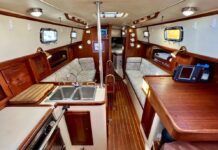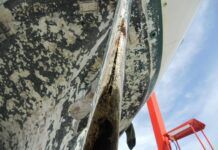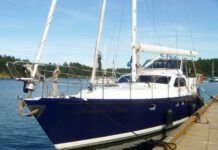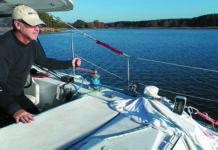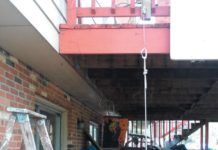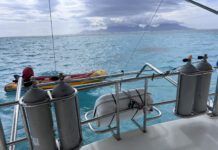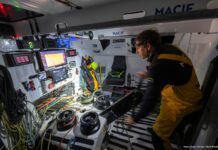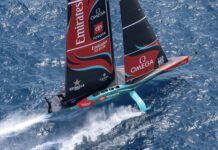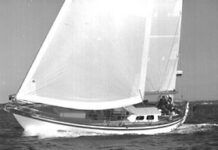The central Turkish port of Marmaris is the heart of the burgeoning eastern Mediterranean charter boat business. Netsel Marmaris Marina is filled with hundreds of squeaky-clean bareboats from half a dozen charter agencies that specialize in European clients. Our dock was the home of the German-owned Sun Charter fleet.
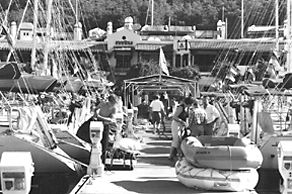
Several dozen boats—primarily French-builtJeanneaus—are turned around by this company everyweekend, disgorging hundreds of logy, sunburnedGermans on the docks. They are replaced the next dayby planeloads of pale German sailors trundling casesof beer and wine down to their charter boats. More Turksin this area speak German than English.
The local crewed charter boats, called gulets, arepurpose-built descendants of sail-powered coastalfreighters. Varying in length from about 35′ to 80′,these are massive boats for their length, like theircargo-carrying ancestors. Most are exquisitelymaintained, lavish with varnish and polished stainlesssteel. With huge, canopied cockpits, even small guletshave comfortable lounging areas.
While they all maintain rudimentary sailing rigs,these are really motorboats. The canvas rigged on thebooms may look like sails, but the “sails” are morelikely to be awnings, unfurled at anchor.
Some gulets are graceful, others clunky. All have thebasic characteristics of wooden construction, widebeam, relatively shoal draft, lots of varnish, hugeengines, and tons of cabin space. They are usuallyoperated at full throttle, with little attention paidto the rules of the road.
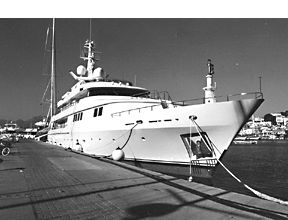
The town of Marmaris has well over 100 gulets catering to the tourist trade. These are primarily Med-moored in front of the dozens of small restaurants lining the waterfront. Between the restaurant hawkers, the Turkish string bands, the aggressive rug merchants, and the muezzins calling the faithful to prayer, the Marmaris waterfront is a cacophony of conflicting sounds, a veritable Tower of Babel in Turkish, German,and English.
As long as you keep your sense of humor and aren’tbothered by music that continues into the wee hours,it’s a wonderful place.
There are huge private yachts here as well. The dock behind us is used by megayachts, both power and sail, which take turns sucking big fuel trucks dry. Telecommunications and high-tech may be hurting on the US stock market, but the big-time owners are still doing well.
The 200-foot US-built Frequency, which dropped in for a few days, is owned by a Turkish digital communications tycoon. Smaller high-performance toys—a 40-foot catamaran and a 48′ foot speedboat, both operated by American crews—follow the big boat from port to port.
With a name like AirWaves, we suspect that theequally large motoryacht pictured on the next page is owned by someone who has made more than a few dollars—or lira, or pounds sterling, or Deutschmarks, or Euros—in the communications field.
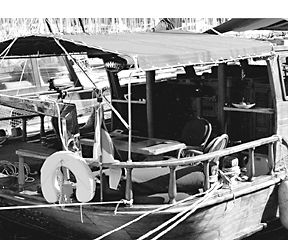
No matter what the nationality of the real owner, all these boats are owned by corporations chartered in tax havens like the Cayman Islands or Bermuda. It seems like every European has a digital phone in his pocket or in her handbag, and the money just keeps rolling in.
The sailing yachts are equally impressive. A halfdozen sailboats over 120 feet long stopped in Marmariswhile we were there. The graceful Shamoun and theelegant, modern Yanneke are almost too beautiful tobelieve. The crews work like dogs to keep them asperfect as possible. After the high tension of the Red Sea and the Middle East, the somewhat decadent self-indulgence of the Med is a welcome change. We may be on the fast track west, but it’s a laid-back, comfortable fast track.
We doubt that Odysseus had it any better wandering across the eastern Mediterranean more than 2000 years ago, when he hung out with the original Calypso. The siren song may be a little loud, but the wine ain’t bad, and the calamari is out of sight. Our Calypso thinks she’s home at last. She doesn’t know she still has one more ocean to cross this year.
Also With This Article
Click here to view “The Ceremony of the Chain.”
Click here to view “Small Sign, Big Problem.”





